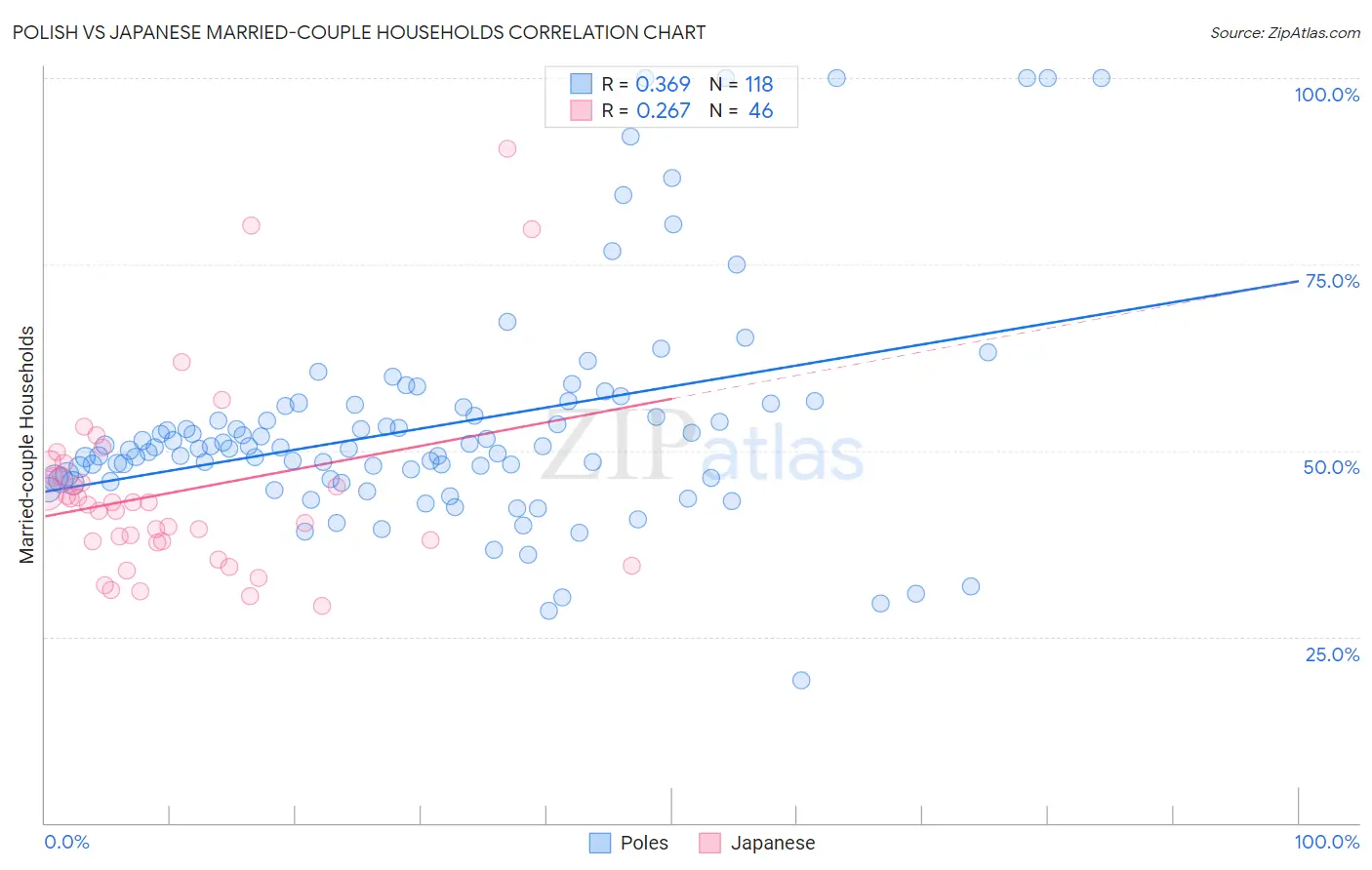Polish vs Japanese Married-couple Households
COMPARE
Polish
Japanese
Married-couple Households
Married-couple Households Comparison
Poles
Japanese
48.5%
MARRIED-COUPLE HOUSEHOLDS
99.2/ 100
METRIC RATING
57th/ 347
METRIC RANK
45.2%
MARRIED-COUPLE HOUSEHOLDS
5.7/ 100
METRIC RATING
214th/ 347
METRIC RANK
Polish vs Japanese Married-couple Households Correlation Chart
The statistical analysis conducted on geographies consisting of 559,940,539 people shows a mild positive correlation between the proportion of Poles and percentage of married-couple family households in the United States with a correlation coefficient (R) of 0.369 and weighted average of 48.5%. Similarly, the statistical analysis conducted on geographies consisting of 249,071,577 people shows a weak positive correlation between the proportion of Japanese and percentage of married-couple family households in the United States with a correlation coefficient (R) of 0.267 and weighted average of 45.2%, a difference of 7.4%.

Married-couple Households Correlation Summary
| Measurement | Polish | Japanese |
| Minimum | 19.1% | 29.2% |
| Maximum | 100.0% | 90.5% |
| Range | 80.9% | 61.3% |
| Mean | 53.2% | 44.4% |
| Median | 50.3% | 42.9% |
| Interquartile 25% (IQ1) | 46.2% | 37.8% |
| Interquartile 75% (IQ3) | 56.0% | 46.6% |
| Interquartile Range (IQR) | 9.8% | 8.8% |
| Standard Deviation (Sample) | 15.2% | 12.6% |
| Standard Deviation (Population) | 15.1% | 12.5% |
Similar Demographics by Married-couple Households
Demographics Similar to Poles by Married-couple Households
In terms of married-couple households, the demographic groups most similar to Poles are Immigrants from Indonesia (48.5%, a difference of 0.0%), Czechoslovakian (48.5%, a difference of 0.010%), Croatian (48.5%, a difference of 0.080%), Immigrants from Lithuania (48.6%, a difference of 0.090%), and Austrian (48.6%, a difference of 0.090%).
| Demographics | Rating | Rank | Married-couple Households |
| Samoans | 99.4 /100 | #50 | Exceptional 48.7% |
| Eastern Europeans | 99.3 /100 | #51 | Exceptional 48.6% |
| Irish | 99.3 /100 | #52 | Exceptional 48.6% |
| Whites/Caucasians | 99.3 /100 | #53 | Exceptional 48.6% |
| Immigrants | Lithuania | 99.3 /100 | #54 | Exceptional 48.6% |
| Austrians | 99.3 /100 | #55 | Exceptional 48.6% |
| Immigrants | Northern Europe | 99.3 /100 | #56 | Exceptional 48.6% |
| Poles | 99.2 /100 | #57 | Exceptional 48.5% |
| Immigrants | Indonesia | 99.2 /100 | #58 | Exceptional 48.5% |
| Czechoslovakians | 99.2 /100 | #59 | Exceptional 48.5% |
| Croatians | 99.1 /100 | #60 | Exceptional 48.5% |
| Bulgarians | 99.1 /100 | #61 | Exceptional 48.5% |
| Luxembourgers | 99.1 /100 | #62 | Exceptional 48.5% |
| Basques | 99.0 /100 | #63 | Exceptional 48.4% |
| Northern Europeans | 99.0 /100 | #64 | Exceptional 48.4% |
Demographics Similar to Japanese by Married-couple Households
In terms of married-couple households, the demographic groups most similar to Japanese are Yakama (45.2%, a difference of 0.020%), Immigrants from Nepal (45.2%, a difference of 0.020%), Immigrants from Portugal (45.2%, a difference of 0.020%), Panamanian (45.2%, a difference of 0.040%), and Immigrants from the Azores (45.2%, a difference of 0.070%).
| Demographics | Rating | Rank | Married-couple Households |
| Immigrants | France | 8.8 /100 | #207 | Tragic 45.4% |
| Hispanics or Latinos | 8.7 /100 | #208 | Tragic 45.4% |
| Immigrants | Uzbekistan | 8.4 /100 | #209 | Tragic 45.4% |
| Cubans | 7.7 /100 | #210 | Tragic 45.4% |
| Immigrants | Spain | 7.3 /100 | #211 | Tragic 45.3% |
| Creek | 6.4 /100 | #212 | Tragic 45.3% |
| Yakama | 5.8 /100 | #213 | Tragic 45.2% |
| Japanese | 5.7 /100 | #214 | Tragic 45.2% |
| Immigrants | Nepal | 5.6 /100 | #215 | Tragic 45.2% |
| Immigrants | Portugal | 5.6 /100 | #216 | Tragic 45.2% |
| Panamanians | 5.5 /100 | #217 | Tragic 45.2% |
| Immigrants | Azores | 5.3 /100 | #218 | Tragic 45.2% |
| Nicaraguans | 5.3 /100 | #219 | Tragic 45.2% |
| Immigrants | Thailand | 5.1 /100 | #220 | Tragic 45.2% |
| Tlingit-Haida | 4.9 /100 | #221 | Tragic 45.1% |